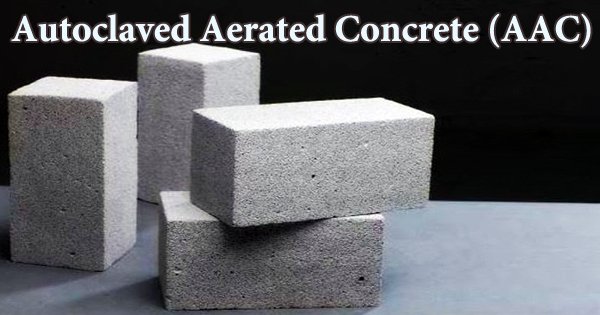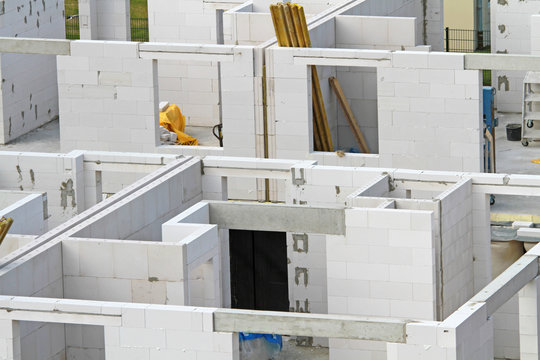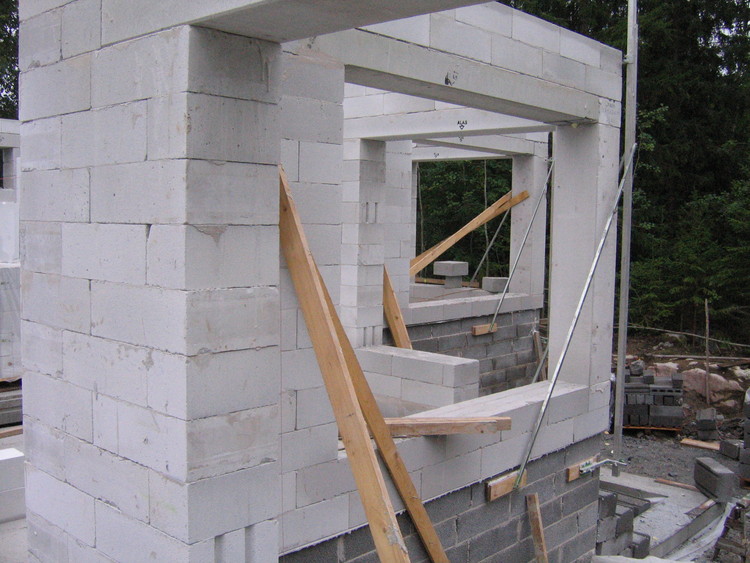Table of Contents
Introduction
Autoclaved Aerated Concrete (AAC), also called cellular concrete, is a light and porous type of concrete. It is made by mixing cement, water, sand, lime, and aluminum powder. When the aluminum powder reacts with water, it creates hydrogen gas, which forms bubbles in the concrete. These bubbles make AAC lightweight and porous.
Autoclaved Aerated Concrete is a versatile building material that can be used for a variety of applications, including walls, floors, roofs and cladding. It is also used for making furniture, countertops and other interior finishes.

AAC has a number of advantages over other building materials, which are discussed later in this post.
AAC is a relatively new building material, but it has become increasingly popular in recent years. This is due to its combination of advantages, such as its lightweight, strong, insulating, fire-resistant, durable, and eco-friendly properties.
How is Autoclaved Aerated Concrete made?
AAC is made in a two-step process:
- The first step is to mix the raw materials together. This mixture includes cement, water, sand, lime, and aluminum powder.
- The second step is to autoclave the mixture. This is done by placing the mixture in an autoclave, which is a high-pressure and high-temperature chamber. The autoclave process causes the aluminum powder to react with the water to produce hydrogen gas, which forms bubbles in the concrete.
The autoclave process takes about 12 hours to complete. After the autoclave process is complete, the AAC blocks are ready to be used.
Advantages of AAC
As mentioned earlier, AAC has a number of advantages over other building materials. These advantages include:
Lightweight
AAC is about one-third the weight of traditional concrete, making it easy to transport and handle. This can save on shipping costs and make it easier to build with AAC.
Strong
AAC is strong enough to be used for load-bearing applications. This means that it can be used to build walls, floors, and roofs.

Insulating
AAC is a good insulator, making it ideal for use in energy-efficient buildings. This can save on energy costs.
Fire-resistant
AAC is fire-resistant and can help to protect buildings from fire damage. This is important for safety reasons.
Durable
AAC is durable and can withstand a variety of weather conditions. This means that it can be used in a variety of climates.
Eco-friendly
AAC is made from natural materials and is a sustainable building material. This means that it is good for the environment.
Disadvantages of AAC
Although AAC has many advantages, there are also a few disadvantages to consider. These disadvantages include:
Cost
AAC can be more expensive than other building materials, such as traditional concrete.
Water absorption
AAC is porous and can absorb water. This can make it susceptible to mold and mildew growth.
Strength
AAC is not as strong as other building materials, such as steel or concrete. This means that it may not be suitable for all applications.
Applications of AAC
AAC is a versatile building material that can be used for a variety of applications. Some of the most common applications for AAC include:
Walls
AAC blocks are often used to build walls in both residential and commercial buildings. AAC walls are lightweight and strong, and they can be easily insulated.

Floors
AAC blocks can also be used to build floors. AAC floors are lightweight and strong, and they can be easily insulated.
Roofs
AAC blocks can also be used to build roofs. AAC roofs are lightweight and strong, and they are also fire-resistant.
Cladding
AAC panels can be used to clad buildings, providing a weather-resistant and attractive exterior.
Furniture
AAC can be used to make furniture, such as tables, chairs, and countertops. AAC furniture is lightweight and strong, and it is also fire-resistant.
Interior finishes
AAC can be used to create a variety of interior finishes, such as walls, ceilings, and countertops. AAC finishes are lightweight and strong, and they are also fire-resistant and easy to clean.
AAC is a versatile building material that has a number of advantages over other building materials. However, there are also a few disadvantages to consider. Overall, AAC is a good choice for many building applications.
Additional Tips
Here are some additional tips for working with AAC:
- Read the manufacturer’s instructions carefully before you start working with AAC.
- Use the right tools for the job.
- Follow the manufacturer’s instructions for cutting and sealing AAC blocks.
- Allow the material to dry properly before you apply a finish or load the structure.
- Consult with a qualified contractor or engineer if you are unsure about how to work with AAC.
By following these tips, you can ensure that your AAC project is a success.

Where to buy AAC
AAC blocks and panels are available from a variety of suppliers. You can find AAC suppliers online or in your local building materials store.
Cost of AAC
The cost of AAC varies depending on the type of AAC product, the size of the product, and the supplier. However, AAC is generally more expensive than traditional building materials, such as concrete.
Sustainability of AAC
AAC is a sustainable building material because it is made from natural materials and it can be recycled. AAC is also a low-maintenance building material, which means that it requires less energy and resources to maintain.
Conclusion
AAC is a versatile, sustainable, and energy-efficient building material that has a number of advantages over other building materials. If you are looking for a lightweight, strong, and insulating building material, AAC is a good option.
I hope this article will help you to understand What is Autoclaved Aerated Concrete (AAC). You may also want to see my other post on my Blog. If I have missed anything here, please let me know about that in the comment below this post.
Share it with your friends.
Happy Learning.
If you liked this article, then please help me to share this article with your friends through Facebook, Twitter, WhatsApp or Instagram. You can also find us on Facebook, Twitter, Instagram, Telegram Channel, YouTube Channel, and Pinterest. Also, Subscribe to our mailing list to get a new post update from us. And, do me a favour, if you find this post helpful, rate a 5 star below-




